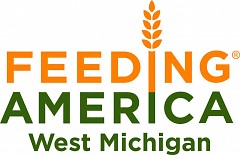
Feeding America West Michigan provides food to hundreds of Grand Rapids agencies, including Northwest Food Pantry. /Feeding America West Michigan
This dispatch was added by one of our Nonprofit Neighbors. It does not represent the editorial voice of The Rapidian or Community Media Center.

Feeding America West Michigan provides food to hundreds of Grand Rapids agencies, including Northwest Food Pantry. /Feeding America West Michigan
Waverly Knight understands what it’s like to be hungry.
In 2007, Waverly lost her job. Single, lonely in her apartment and trying to find a job, she began to wonder about volunteering with her West Side church, Trinity Reformed. When she learned about an opportunity with their ministry, the Northwest Food Pantry, one of Feeding America of West Michigan’s hunger-relief agencies, she signed up.
While she planned to only stay until she found other employment, Waverly’s love for helping others through the pantry grew. Before long, she found herself co-director of the ministry.
“I’ve been homeless, I’ve had no job, no money, no food, all of the above,” she said. “That’s all helped me relate to my clients. So I understand most of what they’re going through. That’s helped me to have such a passion for the ministry.”
Clients of the pantry are allowed to visit once a month and fill a cart with food to support themselves and their families. Many of them are working but aren’t earning enough to cover all their expenses.
“There’s so many families out there where minimum wage doesn’t cut it,” she said.
Roberto is on a small income of a different sort, a fixed disability payment for his injured back.
He’s not just a client of the pantry but a volunteer as well. Being involved with the pantry has enriched his life, he said. His wife and three young granddaughters get enough to eat, and he has the opportunity to help others in his community.
Watching his mom feed his family of 17 growing up, Roberto learned the importance of helping and caring for others. “She had to cook for an army, and that’s how I learned,” he said. “And it turns out pretty good in the end.”
When cooking, he makes sure there are leftovers to feed others, whether his family the next day or kids in his neighborhood. “Sometimes, spaghetti’s better the second time over,” he joked.
Roberto loves being in the kitchen. Sometimes, he even lets his granddaughters help him cook.
“I cook just about everything: spaghetti, goulash, tacos,” he said. “I can pretty much do whatever.”
His heart for serving others is noticeable as he stocks the pantry’s shelves, directs clients and packs boxes. Not only does he help the pantry, but the pantry provides him an opportunity to get out of the house and work through his depression.
“I’m doing a lot better since I started here,” he said. “I feel good about it. They’re helping me to help a lot of people.”
Becky discovered Northwest Food Pantry by calling the United Way’s 2-1-1 hotline.
For her, a new place to live plus car payments on a ‘96 Dodge Stratus plus caring for two teenagers equals not much left over for groceries. Each month, she comes to pick out and bring home a cart of food for her boyfriend, niece and nephew who live with her.
Becky and her boyfriend face a common dilemma: They earn too much money to qualify for food assistance but not enough to meet their needs.
“It’s like being stuck between a rock and a hard place,” she said.
The pantry’s “been a big help. If I didn’t have it, we might be struggling a lot more.”
When Becky walks around the pantry on her visits, she keeps her eyes out for certain items like spaghetti, bread, chicken, and especially fresh fruits and vegetables. “I try to keep up on things I’ll be able to make meals with,” she said. “Make sure it will stretch for all of us, that it’ll go for everyone.”
The variety of food found at Northwest Food Pantry is possible through its partnership with Feeding America West Michigan and donations from businesses including Meijer, Aldi, Panera, D&W, Arnie’s and even Olive Garden.
For Waverly, letting people go hungry is not an option. “I know what it’s like to be at home and not have any food and not tell anyone. And it breaks my heart.”
“Please don’t ever sit at home and go without,” she said, “please don’t do that.”
Thanks to people like Waverly and Roberto and local agencies like the Northwest Food Pantry, nobody needs to.
This article was written by Ellie Walburg, communications intern at Feeding America West Michigan.
The Rapidian, a program of the 501(c)3 nonprofit Community Media Center, relies on the community’s support to help cover the cost of training reporters and publishing content.
We need your help.
If each of our readers and content creators who values this community platform help support its creation and maintenance, The Rapidian can continue to educate and facilitate a conversation around issues for years to come.
Please support The Rapidian and make a contribution today.